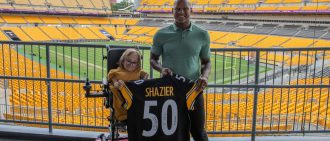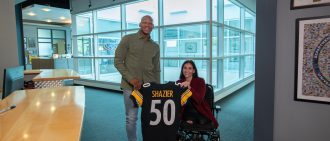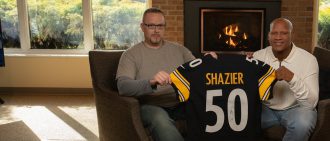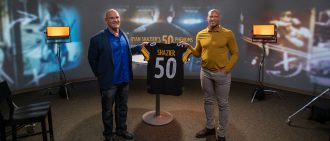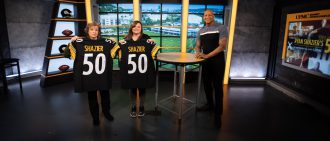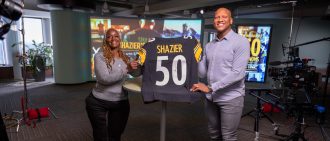Sara Simpson was tailgating for a Pittsburgh Steelers game in 2007 when her left arm snapped.
“My wheelchair broke down, so I was in another wheelchair that I wasn’t quite used to,” she recalls. “We were in a parking lot, and there was a ditch, and my chair slid. My friend was walking alongside me, and he didn’t see that I slid. Somehow my arm got in the way, and I broke my left humerus in half.”
Instead of getting into the game, Sara had to rush to the hospital for surgery on her broken arm.
It wasn’t exactly an uncommon experience for her.
Born with the condition osteogenesis imperfecta (OI) — also known as “brittle bone disease” — Sara has fractured more than 100 bones in her lifetime. The 2007 occurrence was the first time she’d broken a bone as an adult. She needed follow-up surgeries to continue to address the problem.
But Sara, 41, has faced the many challenges of OI with a positive attitude and a determination to keep going. Even after she recently broke her leg — her first major fracture since 2007 — she kept up her resolve.
“I made a promise to myself that I was going to design a life that I loved,” she says. “I’m not going to sit here and tell you that things have always been easy. But I’m doing it because I have no other choice. I like to say that I smile at adversity.”
Ryan Shazier's 50 Phenoms Season 4
‘They Believed I Was Here for a Purpose’
Osteogenesis imperfecta is a group of genetic disorders that affects the body’s ability to make strong bones.
People with OI tend to break their bones more often and more easily. Other complications can include smaller height, bone deformities, hearing loss, and breathing problems. Some types of OI are very severe and can lead to death soon after birth.
Sara was born with type III OI, a moderate form of the disease that still includes frequent fractures. Her condition hadn’t shown up on any prenatal ultrasounds, and at birth, she had a fractured skull, a broken clavicle, a broken arm, two broken legs, and broken ribs.
“Thankfully, my mother delivered me via Cesarean section because that’s how she had my older sister,” Sara says. “And in hindsight now, if she would’ve had a natural birth, I probably wouldn’t be here today.”
Doctors diagnosed Sara with OI and transferred her to Children’s Hospital. She spent a month in the neonatal intensive care unit (NICU) before she could go home.
Sara’s first post-birth fracture happened soon after she returned home, and she experienced many more as a child. She had her first orthopaedic surgery at Children’s Hospital at 3 years old. Doctors placed metal rods in her arms and legs to try to provide support and prevent fractures.
While in recovery, Sara went into cardiac arrest. Somebody — Sara’s family never found out who — revived her with lifesaving CPR.
“My parents have always told me that they believed I was here for a purpose,” Sara says. “They broke three of my ribs giving me CPR, which, if you think about it, that’s pretty amazing. The fact that that’s all that happened to me is pretty amazing.”
Never Miss a Beat!
Join the email list and receive updates for Ryan Shazier's 50 Phenoms.
Thank you for subscribing!
You can now select the specific newsletters you'd like to receive.
You are already subscribed.
Subscribe to more newsletters in our email preference center.
Sorry, an error occurred. Please try again later.
Get Healthy Tips Sent to Your Phone!
‘They Just Saw Me as Sara’
Because of her OI, Sara has a short stature and uses a wheelchair to get around. But she never let that affect her, even as a child. She was the second of three daughters, and her parents treated her the same as her sisters.
“They just never let my disability define who I was,” she says.
Sara attended public school in the suburbs outside Pittsburgh. She became the first person in her school district’s history to attend kindergarten through 12th grade while using a wheelchair. She missed time here and there when she fractured a bone or had surgery, but she always returned.
“My parents always set high expectations of me. But I also think I set them for myself,” she says. “And when I credit my mom and dad, my mom always says, ‘No, I didn’t give you your personality. I said, ‘Yeah, but you gave me the tools that I needed to get to where I am.'”
During all of her years of schooling, Sara says she didn’t experience bullying.
“My peers never saw me as anything different,” she says. “They just saw me as Sara. I was equal to them.”
The same held true in her professional life. Sara spent years in the corporate world, first for U.S. Airways and then for FedEx. Despite being the only person in her office to use a wheelchair, Sara says her co-workers embraced her.
“I just always feel that because everybody showed me kindness and was respectful to me, I always want to give that back,” she says. “Whether it’s in the workplace, at home, in my personal life, I believe that that is so important.”
‘She Should Be Admired’
Sara’s OI does cause her complications both from a medical standpoint and in everyday life.
Debra Salim, MD, Sara’s primary care physician since 2009, says it’s important to treat even the most minor illnesses like a cold because the act of coughing can cause Sara to fracture ribs.
“You have to be a bit more concerned with even the slightest type of illness,” says Dr. Salim, internal medicine physician, Pittsburgh Primary Care-UPMC.
“Outside of the osteogenesis imperfecta, she’s pretty healthy. But then when you take a look at something that might be more acute, you do have to be careful. Someone else, you may say, ‘OK, just give it a few days,’ and they would just get better. Whereas with her, there’s more possibilities of devastating effects.”
Because of the bone deformities that OI causes, surgery and recovery also can be more difficult. After she broke her arm in 2007, Sara underwent multiple follow-up procedures to continue to address complications of the fracture.
“The biggest thing is their bones don’t behave like normal bones,” says John Fowler, MD, professor, UPMC Department of Orthopaedic Surgery. “They don’t heal the same way with the normal types of surgical fixation we use. Their joints really just get destroyed. Sara has just atrocious arthritis in almost all of the joints in her body, and her bones are crooked.”
Although Dr. Fowler specializes in hand, shoulder, and elbow orthopaedic surgery, he also consults on lower-body injuries for Sara. He calls her “the type of patient that you want to have.”
“She is incredibly intelligent,” Dr. Fowler says. “She’s very good at following directions because of everything she’s been through. She has very high health care literacy. So when you talk to her about diagnosis and conditions and the type of surgery you’re planning, the type of treatment, she really understands that.”
Beyond the medical issues that OI causes, everyday tasks can present a challenge, too. Because Sara uses a wheelchair, she has trouble going places that aren’t wheelchair-accessible. She also runs into problems in parking lots when people park illegally next to her wheelchair-accessible van, making it impossible for her to use the van’s ramp to get in or out.
Although her wheelchair now raises up, Sara cannot reach the countertop at her home. And she can go to the bathroom by herself, but she needs someone to take her there.
“Little everyday things that people of abled body just can get up and go and do, or walk into a store and go and do, I have to have a plan in place,” she says. “I can most definitely do it, but I have to have a plan in place.”
As an adult, Sara developed hearing loss, another complication of OI. She wears hearing aids to help her.
Despite the difficulties she faces, Sara doesn’t back down. Dr. Salim says every time she encounters Sara, she has a smile on her face.
“She’s fought against something that some people could say, ‘Oh, this isn’t fair. Let me just give up,'” Dr. Salim says. “But, really, I think she should be admired for everything she’s done.”
‘Maybe This Is Your Calling’
Until a few years ago, Sara worked a regular 9-to-5 job. But the wear and tear was putting her tiny body at risk for fractures, so on the advice of her doctors, she had to stop working.
The news hit her hard because she enjoyed working. But it did allow her to become a full-time public speaker. She now speaks at corporations, schools, and various organizations about topics like bullying, living and working with a physical disability, and social awareness.
“I was sad for a little bit,” Sara says about not working her corporate job anymore. “And then I thought to myself, ‘Maybe this really is your purpose. And maybe this is your calling to educate others about what it’s like to live a day in my shoes.'”
When she talks to others, Sara tells them she never wanted to be treated differently because of her condition. She never wanted it to define her.
“I don’t think what I’ve done are accomplishments,” she says. “I never view my life that way. I don’t view my life as an inspiration, either. I view my life as this is what I was given. This is what I have to work with. And this is just what I have to do.”
Sara says the support of many people helped her get to where she is today — her parents and sisters, the rest of her family, her many friends, and her doctors.
Sara does get down sometimes, such as when she recently broke her leg.
But she tries to limit those sad times to 24 hours, drawing on advice she received from her orthopaedic surgeon when she was a child. After those 24 hours, she regains her positive attitude.
“I maybe hate my bone disease, but I don’t ever hate my life,” she says. “I think that’s very, very important, and that’s what I always try to tell everyone. I may not like the cards that I was dealt, but I like to think that I’ve played the hand really well that I was given.”
About UPMC
Headquartered in Pittsburgh, UPMC is a world-renowned health care provider and insurer. We operate 40 hospitals and 800 doctors’ offices and outpatient centers, with locations throughout Pennsylvania, Maryland, New York, West Virginia, and internationally. We employ 4,900 physicians, and we are leaders in clinical care, groundbreaking research, and treatment breakthroughs. U.S. News & World Report consistently ranks UPMC Presbyterian Shadyside as one of the nation’s best hospitals in many specialties and ranks UPMC Children’s Hospital of Pittsburgh on its Honor Roll of America’s Best Children’s Hospitals. We are dedicated to providing Life Changing Medicine to our communities.
